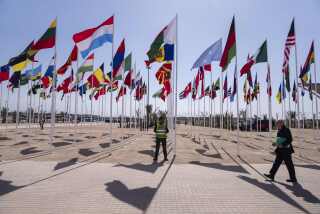Protests or No, IMF Needs Reform
- Share via
The anti-globalization protesters are shaking their Seattle rattle in the streets of Washington this week, but they probably won’t wind up getting as much attention. The police are more alert this time, their issue seems less novel, their numbers are less awesome. Yet while they are wholly unlikely to ever bring the vast force of globalization to its heels, their cause will not die. Globalization is a concept so inherently big and vague and scary that it’s possible to divine almost anything evil or good in it--whether a brave-new-world formula for the wealth of 21st century nations or a perverse prescription for the further impoverishments of all but a cosmopolitan elite. Globalization is one gigantic punching bag for everyone from posturing politicians to overly sincere nongovernmental organizations.
It would be unfair to smear all the protesters as hapless defenders of a sputtering cause. After all, they were bright enough to schedule Seattle II to coincide with the spring meetings of both the World Bank and the International Monetary Fund. Like rival mafia gangs, these two organized-bank families hold their major sit-downs at the same time in case the chieftains want to carve out new territory peacefully. For the protesters, too, having these two giants meet simultaneously is convenient as well as credible: Taken together, the IMF and the World Bank represent a far more consequential target than the World Trade Organization, whose December meeting was the occasion for the Seattle debacle. Unlike the new-to-the block WTO, far less a world power than the protesters think, these long-established titans of the global economy have plenty to answer for.
It is virtually axiomatic now, even within the world’s political establishment, that reforms are in order, especially for the IMF. With nice timing, the Overseas Development Council, a widely respected Washington-based nongovernmental organization, has weighed in this week with a withering critique of the IMF’s performance in the Asian financial crisis and a strong recommendation that it transfer over to the World Bank the longer-range, anti-poverty development portion of its overflowing portfolio. It wants the IMF to concentrate on monitoring the performances of national economies and on swift intervention when serious crises surface. Yet the report calls not for the IMF’s abolition, as its most irresponsible critics do, but for major institutional change. It would end the notorious IMF practice of conditionality, whereby nations have to get down on their knees and lick the IMF’s boots if they want any bailout money.
The Overseas Development Council believes that no national economic reform undertaken under the gun of the IMF is likely to stick over the long run, and indeed only encourages the suspicion among worldwide investors that the reform will soon be abandoned once the IMF goes away. The ODC doesn’t even believe that the IMF played a major role in the Asian recovery: “The bounce-back of most of the crisis-hit Asian countries has been remarkable, and it has had little to do with the implementation of structural reforms since the crisis,” a council report says.
This kind of no-holds-barred analysis is exactly what our globalization institutions require. Some, though certainly not all, of the protest groups in the streets can be induced to participate in a rational process of discussion if they are given reason to believe that a third-way process of participation exists, other than in the suites or in the streets. After all, globalization isn’t always a pretty picture. It can produce overnight pockets of poverty and economic dislocation as well as overnight wealth. That’s why it’s the largest public-policy issue in the world today. With the remaining time he has left as our 42nd president, Bill Clinton should discuss the issue more often and more thoroughly than he has. He has to level with people and explain why there is always pain with gain and why no change is ever real that doesn’t push lives into unexpected directions.
It’s true that the street demonstrators aren’t engaging in the most sophisticated or helpful dialogue. Yet until the grand debate on globalization is truly joined and a third way invented that improves on both the debate and the very concept, those who still don’t get or still don’t buy it will be back to the barricades and back to the future of sometimes violent protest in the streets.
Times contributing editor Tom Plate’s column runs Wednesdays. The full text of the ODC report on the IMF is available at the homepage of the Asia Pacific Media Network.
More to Read
Sign up for Essential California
The most important California stories and recommendations in your inbox every morning.
You may occasionally receive promotional content from the Los Angeles Times.












